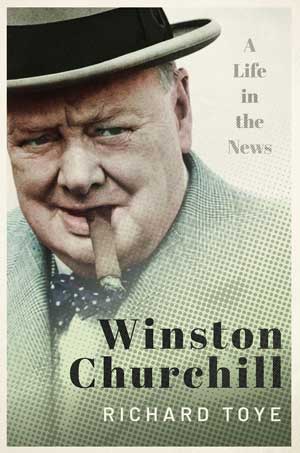
The book is about Winston Churchill’s relationship with the media and the news. Churchill was active in politics from the age of Queen Victoria to that of Elizabeth II, a period which included two world wars, in both of which Churchill played a leading role. During his lifetime, the mass popular press came into its own, but then came under challenge from new media—newsreels, radio, and eventually TV.
The book tackles Churchill’s relationship with the news in three dimensions, first, his own journalism. Second, his efforts to influence or control what was said about him. Third, his evolving media image.
The book starts with the very earliest mentions media mentions of Churchill, the child of Lord Randolph Churchill, who was a renowned and mercurial Conservative politician. It continues until his death and funeral in 1965. During this period, the press was evolving and becoming ever more intrusive. During Churchill’s retirement he made plenty of trips abroad, and the paparazzi would follow him everywhere, trying for example to get shots of him painting, a favourite hobby of his.
The book also deals with the symbolism that surrounded Churchill and the way that he was portrayed. Now, if we think of an object we associate with him, we might think of a cigar. Earlier in his career, though, cartoonists typically drew him wearing a tiny hat. Churchill claimed this was due to an incident during an election campaign in which he picked up the wrong headgear when going outside. Certainly, he knew the value of having identifiable quirks and a colourful image that would ensure he got a lot of coverage.
I would say that the book is best read from start to finish but each chapter is self-contained and therefore hopefully useful in its own right to readers who are interested in particular phases of Churchill’s career.
Although it is a book about one person it is also about the development of the media over a period of nine decades. It is very intriguing to consider how the press operates now and how it came to be that way. Although it is rather crude to think in terms of whether the media was better or worse in those days, I found myself doing so during the research. In some respects, politicians tended to get much more of a free pass, especially when it came to their private lives and finances. But it’s wrong to imagine that journalists of the period were simply a pushover. The press was very polarised, and politicians could be viciously attacked.
Although Churchill was often much too sensitive about criticism, it is true that he frequently received harsh treatment. It is a very subjective thing, but my impression is that if one thing was better about journalism in those days, it was the quality of the writing. It is possible to read articles that were incredibly misleading and unfair and yet still to admire the way that they were expressed. I can’t say I feel that way about many writers these days, though one does, of course, have to be very careful about suggesting that Churchill’s era is a lost golden age.
I have written books about Churchill before, but it seemed to me that this theme of the media I Churchill’s life was one that no scholar had previously covered in all its angles. The research on the subject was greatly aided by the collection of news cuttings held at the Churchill Archives Centre in Cambridge. These include items from papers which were important at the time but are now obscure or hard to access. Digitised newspapers were of course invaluable as well.
I have to say the first pages in the book should be read first because I deliberately wrote them in order to draw the reader in. They tell of an episode in 1929 when Churchill accused the Daily Herald, a left-wing paper, of faking a photo in order to discredit him. This turned out not to be true. It’s an interesting story with obvious relevance to today’s discourse of “fake news”. It also illustrates Churchill’s habit of flying off the handle, sometimes without knowledge of all the facts, which is a central theme of the book.
I would also point readers to the passage dealing with 10 May 1940, the day Churchill became prime minister. Although the events behind the scenes have been covered in great detail by historians, nobody had previously traced what the public knew about the day’s unfolding events and when.
On the morning of the day in question, the Daily Express carried a report that Chamberlain would stand down—Labour being unwilling to serve under him in a reconstructed government—and that Churchill would likely be the new Prime Minister. By the time that the paper hit readers’ breakfast tables, though, they might already have heard the 7am BBC news, in which it was reported that the Germans had invaded Holland, and that there had been “air activity in the Thames Estuary”. An hour later, it was known that Belgium had been attacked too. In the light of the news of the German actions, Chamberlain briefly determined to hang on, but quickly bowed to the inevitable. At 6pm listeners were told that the British War Cabinet had met three times and that “the French Council of minister is in session at this moment”. At three minutes to six, Chamberlain arrived at Buckingham Palace. Just over half an hour later, he emerged, to be followed in at once by Churchill. It was now clear to journalists that the change had been made; but the public did not yet know. At 9pm Chamberlain himself made a broadcast, in which he announced his replacement by Churchill. The American news agency United Press quickly reported that “The change of government was being accomplished in record-breaking speed for the ordinarily slow and traditionally form-bound British parliamentary system. Only this morning it generally was believed that despite the unleashing of the German attack on the low countries and the imminent threat to the British Isles that it would be 10 days or a fortnight before a new government might be formed”.
There are actually some similarities—though one should not overstate them—between current conditions and World War II. This might provide readers with a bit of distraction from the Covid situation. Then, people were desperate for news about the unfolding military situation, and they had to wait for hourly news bulletins that were often bland and uninformative. Today, we often find ourselves “doom-scrolling” through social media, and although news reporting is virtually instant nowadays, it can be just as hard as it was in the 1940s to find facts and analyses that actually meet our emotional needs.
I would also like the book to provoke thought about the relationship between the media and politics. There are many examples in the book of how Churchill overreacted to press criticism; during World War II, he was even getting close to shutting down the Daily Mirror. I don’t give these examples in order to suggest that he was a bad person or even especially unusual—he was under a lot of stress, especially during the war, and many other politicians were equally thin-skinned. The interesting question is why, when he banged the table and started suggesting that the press should be silenced, he tended not to get his way. I think it’s in part because there were robust institutional restraints and in part because different sections of the media stuck together. The Mirror was not much liked by many other papers, but they saw the implications, if one newspaper could be arbitrarily shut down—and rallied round. So, when we see politicians lashing out at the media, we should perhaps think less about condemning them as individuals and more about the collective steps we can take to help preserve press freedom.


Richard Toye is Professor of Modern History at the University of Exeter. He is a specialist in the history of rhetoric and is the author of numerous articles and several books, including Rhetoric: A Very Short Introduction (Oxford, 2013) and The Roar of the Lion: The Untold Story of Churchill’s World War II Speeches (Oxford, 2013).